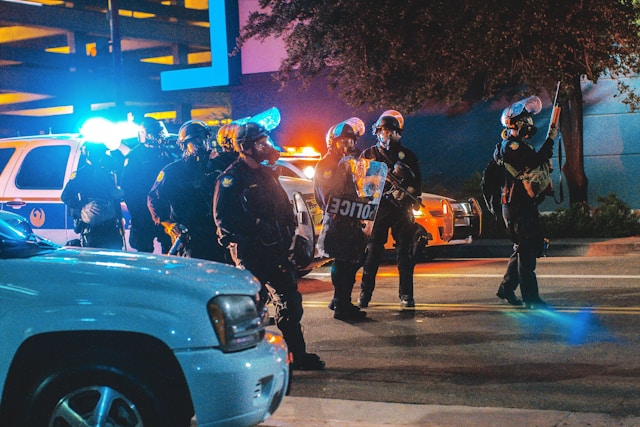Demonstrators in Peckham face police action while protesting against the transfer of asylum seekers to a new location, resulting in multiple arrests
Police arrested forty-five individuals in Peckham, South London, following a heated confrontation with demonstrators protesting the transfer of asylum seekers. The incident took place early yesterday morning outside a local hotel, where activists had surrounded a coach intended to relocate asylum seekers to the Bibby Stockholm barge in Dorset.
The protest began around 08:40 BST, with activists forming a blockade around the bus. Despite tensions, the coach departed at approximately 15:00, apparently empty, as officials navigated the growing crowd and chants from demonstrators. The protesters expressed concerns over the suitability of the Bibby Stockholm and the lack of consultation with those affected.
This protest aligns with a broader national conversation on asylum seeker accommodations. The Home Office has been actively seeking alternatives to hotel housing, citing significant costs to taxpayers. According to a spokesperson, the shift to alternative accommodations like the Bibby Stockholm is part of an effort to manage expenses while considering the needs and objections of asylum seekers.
The situation escalated as some protesters reportedly assaulted police officers during the standoff. The Metropolitan Police confirmed the arrests were for obstruction of the highway, obstructing police, and assault on police, with one additional arrest for a racially aggravated public order offense.
Amidst the chaos, the demonstrators argued that the individuals due to be relocated had established connections within the Peckham community and that moving them to the Bibby Stockholm would be disruptive. Recent attempts to relocate other groups have faced similar resistance, indicating a growing unrest over this policy.
As the police worked to clear the scene, the road was closed, and significant police resources, including riot vans, were deployed to manage the crowd. Deputy Assistant Commissioner Ade Adelekan emphasized the police’s commitment to facilitating peaceful protests but noted that actions would be taken against disruptions and criminal activities.
The protest not only underscores the tensions in local communities but also highlights the challenges facing the UK’s asylum policy, particularly in the context of an increase in Channel crossings. Recent statistics show a significant rise in such crossings, with over 8,000 people having arrived this year, a 34% increase from the previous year.
As the government pushes forward with its plans to reduce reliance on hotel accommodations for asylum seekers, the responses from local communities and activists suggest that this will continue to be a contentious issue
